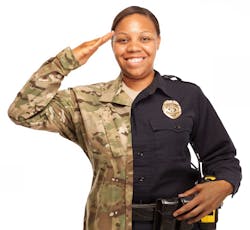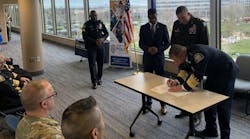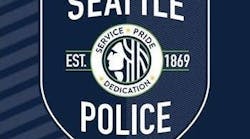This is one part of a 3 part series of hiring a military veteran as your new law enforcement officer. Additional articles can be found at "How to Hire a Military Veteran as a Law Enforcement Officer" and "The Additional Training Military Veterans may Require as a Law Enforcement Officer".
There are a variety of benefits that a LE department will gain when hiring a military veteran. This is a concise list, but it aptly demonstrates how well suited military veterans are for careers in LE.
Individual Vets Have ...
■ A Sense of Purpose and Mission.
This is the most important attribute that a military veteran brings to a department. Military veterans have created and defined their own sense of purpose from serving in the military and this well readily and effectively translate into serving a community as a law enforcement officer.
■ Advanced First Aid Training.
Military veterans, especially combat veterans, have a head start in exposure and mental clarity with first aid and advanced first aid training. Military first aid training focuses on extreme trauma and applying effective life saving measures immediately. This is very true from combat veterans from Iraq and Afghanistan that may have first-hand experience in treating injuries.
■ Dedication to Fellow Officers.
Military veterans, regardless of rank, branch of service, and military job specialty will have an instant sense of commitment, respect, and understanding how to work in an LE role. They will know these because the powerful sense of individual respect and team work that the military services promote.
■ Physical Fitness & Personal Professionalism.
Staying in shape, a strong belief in a professional demeanor, and a professional appearance is a core of the US Military. Veterans will be in shape, understand their responsibility to appear and act professional always, and innately understand that their wear of the uniform is a direct reflection upon themselves and their community.
■ Understanding a Chain of Command.
How a chain of command operates, how to receive and take orders, and how to ask questions and display initiative within a chain of command is something that is essential to law enforcement. It is extraordinarily challenging to take someone not used to working in a chain of command structure and then expect them, overnight, to be comfortable and proficient. Military veterans work well and understand how to flourish within a chain of command structure.
■ Weapon Professionalism & Safety.
Anyone who ever carries a weapon in a professional capacity must constantly be concerned with weapon professionalism and safety. Weapon professionalism is understanding how to use the weapon as one of many options to solve LE challenges, and the incredible consequences of the use of a weapon. Weapon safety is overstressed in all military services with keeping the weapon in a prepared to fire position with a clean weapon, clean ammunition, never assuming a weapon is clear, and constantly checking muzzle direction and the safety.
The Benefits of a Military Veteran Hire
Military veterans bring skills in planning, intelligence, preparation, and reconnaissance that reinforce existing department LE skill sets. Military mission preparation skill sets are not superior to LE mission preparation skills. Military mission preparation skills serve in a reinforcing and supplementing role to existing LE practices.
■ Experience in All Types of Weather and Terrain.
Each department has their own weather and terrain that can make policing difficult. If you are in Montana or North Dakota, then a candidate with extensive wintry weather experience is very valuable to your departments skill sets. Likewise, for a department in Florida, a candidate experienced working in swamps or along the shore, is ideal to your department. This experience working confidently and effectively in weather and terrain cannot be overstated in its value.
■ Incorporate Intelligence to Operations.
Military people love, love, and love intelligence. Military intelligence professionals look at the enemy, but they also look at the weather, moon phase, tides, and create elaborate likely enemy actions. This ability to incorporate intelligence to operations is a great skill set for a department. The LE community does this, in some ways superior to the military, but to get candidates that already understand, know, and appreciate this process is invaluable.
■ Mission Planning Process.
The Military Mission Planning Process is a systematic process of understanding the objective to be accomplished, incorporating intelligence to improve success, creating a simple and effective plan, resourcing and rehearsing the plan and things that can go wrong, executing the operation, and then learning how to do the mission better the next time are all aspects of the Military Mission Planning Process. The LE community also uses a similar process, but the Military Planning Process creates remarkable success.
■ Mission Preparation.
Preparing for a mission is as important as conducting the mission. Having the correct equipment, the correct people on the team, staging ambulances and language translators close by, and having an effective plan are all aspects of mission preparation. Watch a video of a US Army Ranger School class preparing for a dismounted patrol. Equipment laid out, batteries checked, canteens topped off, and sensitive equipment tied down and you will gain appreciation for military mission preparation.
■ The Use of Rehearsals to Improve.
Rehearsals are a core aspect of military success at the individual and team level. Teams rehearse casualty treatment and evacuation, how to clear a room, how to recover a damaged vehicle, and how to search a prisoner. The idea of rehearsals as an essential, vital, and necessary step to prepare for and conduct operations is in the blood of military veterans. The skill to plan, conduct, learn from, and then re-conduct a rehearsal until it is correct is a vital military skill for a military veteran to bring to an LE role.
■ The Vital Importance of Reconnaissance.
Military veterans also distrust intelligence no matter how good it is and believe that even good intelligence is made better with reconnaissance. Reconnaissance is using personal observation, electronics, and other techniques to verify an enemy and that a certain plan will or will not work. In addition, reconnaissance is a core aspect of the military planning process. Reconnaissance is a must have, not a "nice" to have.



